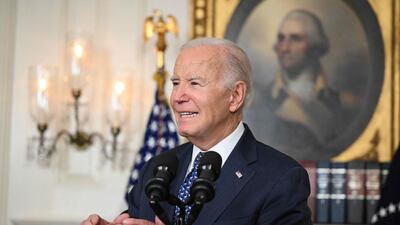US President Joe Biden on Thursday defended his fitness to serve in office after a special counsel included remarks about his memory capacity in a report concluding an investigation into his handling of classified documents.
"My memory is fine," he told reporters in a last-minute evening White House press conference.
"Take a look what I've done since I've become President. Nobody has thought I could pass any of the things I got passed."
A special counsel appointed by the US Justice Department ruled that “no criminal charges are warranted” for Mr Biden's possession of classified documents, given the difficulty to prove intent to break the law.
In his report, publicly released earlier on Thursday, special counsel Robert Hur referred to Mr Biden‘s “significantly limited” memory, which Mr Biden's lawyers argued was "inaccurate and inappropriate" to include.
“Our investigation uncovered evidence that President Biden wilfully retained and disclosed classified materials after his vice presidency, when he was a private citizen,” the executive summary read.
“We conclude that the evidence does not establish Mr Biden's guilt beyond a reasonable doubt.”
Attorney General Merrick Garland appointed Mr Hur to investigate any criminal wrongdoing in Mr Biden's retention of sensitive government documents after his time as vice president to Barack Obama.
"I would take responsibility for not having seen exactly what my staff was doing," Mr Biden said.
"I was pleased to see reached the firm conclusion that no charges should be brought against me in this case," he said, later adding: "I did not break the law."
Yet, as charges were not recommended against Mr Biden, the focus quickly shifted to Mr Hur's non-medical interpretation of the President's memory in his final report.
There have been concerns about Mr Biden, 81, the oldest president in US history, and his mental capacity to serve or run for re-election. Voters have also increasingly raised the topic of his age as an issue.
For example, he has repeatedly muddled up the names of world leaders. In the past week, he has confused the late German chancellor Helmut Kohl with former chancellor Angela Merkel, and French President Emmanuel Macron with former French leader Francois Mitterrand, who died in 1996.
And in the hopes to assuage concerns about his memory, Mr Biden mistakenly referred to Egyptian President Abdel Fattah El Sisi as the leader of Mexico during the press conference on Thursday.
However, Democrats and lawyers questioned why the special counsel felt compelled to include views on his memory in a legal report.
"The bottom line is that the matter is now closed," Mr Biden said.
He said that he co-operated with the special counsel's team, including five hours of interviews.
It is a contrast to charges that former president Donald Trump is facing over possession of classified documents after his presidency ended in 2021, and obstruction in not returning them to authorities when requested.
Mr Hur said the sensitive documents Mr Biden had held included information about military and foreign policy in Afghanistan, with classification markings as high as “top secret” and “sensitive compartmented information”.
They were discovered in a box in Mr Biden's home garage in Wilmington, Delaware, during an FBI search in 2022.
Mr Hur's team discovered that Mr Biden had told a ghostwriter for his book that he had “just found all the classified stuff downstairs” while at a rental house in Virginia in 2017.
“The marked classified documents were found along with drafts of the handwritten 2009 Thanksgiving memo Mr Biden sent President Obama in a last-ditch effort to persuade him not to send additional troops to Afghanistan,” the report said.
“These materials were proof of the stand Mr Biden took in what he regarded as among the most important decisions of his vice presidency.”
The documents labelled "top secret" and "SCI" are deemed damaging to US national security if people not allowed to view them had access. SCI-marked documents are supposed to only be held and viewed in approved facilities.
Mr Hur deduced that the President most probably forgot about the documents or that they were “stored by mistake and without his knowledge”.
While Mr Biden did not have the authority to keep classified documents at the rental Virginia home, he did have the right to do so at his Delaware home during his vice presidency and current presidency.
Mr Hur said it would be difficult to prove the President's intent to break the law due to a "shortage of evidence" and Mr Biden's “significantly limited” memory.
“Mr Biden would likely present himself to a jury, as he did during our interview of him, as a sympathetic, well-meaning, elderly man with a poor memory,” the report said.
“Based on our direct interactions with and observations of him, he is someone for whom many jurors will want to identify reasonable doubt.
“It would be difficult to convince a jury that they should convict him – by then a former president well into his eighties – of a serious felony that requires a mental state of wilfulness.”
On completion of the report, the White House decided not to redact the text before releasing it.
However, Mr Biden's lawyers wrote in a letter that the comments about his memory were "gratuitous" and requested that Mr Hur "revise" them before the report's release.
Developer: Ubisoft Montreal / Ubisoft Toronto
Publisher: Ubisoft
Platforms: Playstation 4, Xbox One, Windows
Release Date: April 10
UAE cricketers abroad
Sid Jhurani is not the first cricketer from the UAE to go to the UK to try his luck.
Rameez Shahzad Played alongside Ben Stokes and Liam Plunkett in Durham while he was studying there. He also played club cricket as an overseas professional, but his time in the UK stunted his UAE career. The batsman went a decade without playing for the national team.
Yodhin Punja The seam bowler was named in the UAE’s extended World Cup squad in 2015 despite being just 15 at the time. He made his senior UAE debut aged 16, and subsequently took up a scholarship at Claremont High School in the south of England.
Election pledges on migration
CDU: "Now is the time to control the German borders and enforce strict border rejections"
SPD: "Border closures and blanket rejections at internal borders contradict the spirit of a common area of freedom"
Our family matters legal consultant
Name: Hassan Mohsen Elhais
Position: legal consultant with Al Rowaad Advocates and Legal Consultants.
Islamophobia definition
A widely accepted definition was made by the All Party Parliamentary Group on British Muslims in 2019: “Islamophobia is rooted in racism and is a type of racism that targets expressions of Muslimness or perceived Muslimness.” It further defines it as “inciting hatred or violence against Muslims”.
J%20Street%20Polling%20Results
%3Cp%3E97%25%20of%20Jewish-Americans%20are%20concerned%20about%20the%20rise%20in%20anti-Semitism%3Cbr%3E%3Cbr%3E76%25%20of%20US%20Jewish%20voters%20believe%20Donald%20Trump%20and%20his%20allies%20in%20the%20Republican%20Party%20are%20responsible%20for%20a%20rise%20in%20anti-Semitism%3Cbr%3E%3Cbr%3E74%25%20of%20American%20Jews%20agreed%20that%20%E2%80%9CTrump%20and%20the%20Maga%20movement%20are%20a%20threat%20to%20Jews%20in%20America%22%3Cbr%3E%3C%2Fp%3E%0A
COMPANY PROFILE
Initial investment: Undisclosed
Investment stage: Series A
Investors: Core42
Current number of staff: 47
Women's Prize for Fiction shortlist
The Silence of the Girls by Pat Barker
My Sister, the Serial Killer by Oyinkan Braithwaite
Milkman by Anna Burns
Ordinary People by Diana Evans
An American Marriage by Tayari Jones
Circe by Madeline Miller
Chef Nobu's advice for eating sushi
“One mistake people always make is adding extra wasabi. There is no need for this, because it should already be there between the rice and the fish.
“When eating nigiri, you must dip the fish – not the rice – in soy sauce, otherwise the rice will collapse. Also, don’t use too much soy sauce or it will make you thirsty. For sushi rolls, dip a little of the rice-covered roll lightly in soy sauce and eat in one bite.
“Chopsticks are acceptable, but really, I recommend using your fingers for sushi. Do use chopsticks for sashimi, though.
“The ginger should be eaten separately as a palette cleanser and used to clear the mouth when switching between different pieces of fish.”
Desert Warrior
Starring: Anthony Mackie, Aiysha Hart, Ben Kingsley
Director: Rupert Wyatt
Rating: 3/5
How does ToTok work?
The calling app is available to download on Google Play and Apple App Store
To successfully install ToTok, users are asked to enter their phone number and then create a nickname.
The app then gives users the option add their existing phone contacts, allowing them to immediately contact people also using the application by video or voice call or via message.
Users can also invite other contacts to download ToTok to allow them to make contact through the app.
BMW%20M4%20Competition
%3Cp%3E%3Cstrong%3EEngine%3A%20%3C%2Fstrong%3E3.0%20twin-turbo%20inline%20six-cylinder%0D%3Cbr%3E%3Cstrong%3ETransmission%3A%3C%2Fstrong%3E%20eight-speed%0D%3Cbr%3E%3Cstrong%3EPower%3A%20%3C%2Fstrong%3E503hp%0D%3Cbr%3E%3Cstrong%3ETorque%3A%3C%2Fstrong%3E%20600Nm%0D%3Cbr%3E%3Cstrong%3EPrice%3A%3C%2Fstrong%3E%20from%20Dh617%2C600%0D%3Cbr%3E%3Cstrong%3EOn%20sale%3A%3C%2Fstrong%3E%20Now%0D%3C%2Fp%3E%0A
Gulf Men's League final
Dubai Hurricanes 24-12 Abu Dhabi Harlequins
The biog
DOB: March 13, 1987
Place of birth: Jeddah, Saudi Arabia but lived in Virginia in the US and raised in Lebanon
School: ACS in Lebanon
University: BSA in Graphic Design at the American University of Beirut
MSA in Design Entrepreneurship at the School of Visual Arts in New York City
Nationality: Lebanese
Status: Single
Favourite thing to do: I really enjoy cycling, I was a participant in Cycling for Gaza for the second time this year
About Seez
Company name/date started: Seez, set up in September 2015 and the app was released in August 2017
Founder/CEO name(s): Tarek Kabrit, co-founder and chief executive, and Andrew Kabrit, co-founder and chief operating officer
Based in: Dubai, with operations also in Kuwait, Saudi Arabia and Lebanon
Sector: Search engine for car buying, selling and leasing
Size: (employees/revenue): 11; undisclosed
Stage of funding: $1.8 million in seed funding; followed by another $1.5m bridge round - in the process of closing Series A
Investors: Wamda Capital, B&Y and Phoenician Funds
The Freedom Artist
By Ben Okri (Head of Zeus)
if you go
The flights
Air France offer flights from Dubai and Abu Dhabi to Cayenne, connecting in Paris from Dh7,300.
The tour
Cox & Kings (coxandkings.com) has a 14-night Hidden Guianas tour of Guyana, Suriname and French Guiana. It includes accommodation, domestic flights, transfers, a local tour manager and guided sightseeing. Contact for price.
What are the influencer academy modules?
- Mastery of audio-visual content creation.
- Cinematography, shots and movement.
- All aspects of post-production.
- Emerging technologies and VFX with AI and CGI.
- Understanding of marketing objectives and audience engagement.
- Tourism industry knowledge.
- Professional ethics.
Paatal Lok season two
Directors: Avinash Arun, Prosit Roy
Stars: Jaideep Ahlawat, Ishwak Singh, Lc Sekhose, Merenla Imsong
Rating: 4.5/5
No Shame
Lily Allen
(Parlophone)
Dengue%20fever%20symptoms
%3Cul%3E%0A%3Cli%3EHigh%20fever%3C%2Fli%3E%0A%3Cli%3EIntense%20pain%20behind%20your%20eyes%3C%2Fli%3E%0A%3Cli%3ESevere%20headache%3C%2Fli%3E%0A%3Cli%3EMuscle%20and%20joint%20pains%3C%2Fli%3E%0A%3Cli%3ENausea%3C%2Fli%3E%0A%3Cli%3EVomiting%3C%2Fli%3E%0A%3Cli%3ESwollen%20glands%3C%2Fli%3E%0A%3Cli%3ERash%3C%2Fli%3E%0A%3C%2Ful%3E%0A%3Cp%3EIf%20symptoms%20occur%2C%20they%20usually%20last%20for%20two-seven%20days%3C%2Fp%3E%0A



